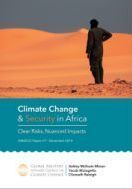'Climate Change & Security In Africa' Paper Published By GMACCC

'Climate Change & Security In Africa' Paper Published By GMACCC
Links between climate patterns and conflict
The Hague, 15 December 2014
The Global Military Advisory Council on Climate Change (GMACCC) has published this month its first in a series of papers on Climate Change and Security. "Climate Change & Security in Africa: Clear Risks, Nuanced Impacts" addresses links between climate patterns and conflict in Africa in order to raise awareness of present and emerging climate-related risks in the region.
Understanding the environmental dimensions of conflicts can improve policy responses that can potentially prevent the adverse impact that climate change has on security outcomes like conflict. The Paper focuses on climate-related stability factors in Mali, Darfur and South Sudan. Food security, migration and disasters are all factors that are taken into account.
Key findings include:
African countries are among the most vulnerable to climate change, as the Earth’s climate is warming faster than previously expected.
The operating environment influences the timing and location of violence.
Although studies generally agree that there is not a link between climate change patterns and civil war, there has been clear link established with other types of violence within states.
Further research is needed to understand the pathways between climate change and security elements including conflict, migration and terrorism.
GMACCC is an initiative of the Institute for Environmental Security. The Council is a global network of serving and retired military officers, and associated institutions, committed to highlighting the potential security implications of a changing climate and advocating action, including by the military, to minimise the risks.